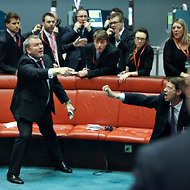PARIS — A European economic report Friday confirmed a continuing slowdown in the euro zone’s factories, even as Washington reported data indicating a moderate improvement in the American economy.
Euro zone manufacturing declined for a 15th consecutive month in October, according to a survey of purchasing managers by Markit Economics, a research firm.
The final Markit purchasing managers’ index fell to 45.4 in October from 46.1 in September. A number below 50 signals contraction.
“A broad-based decline in production was seen across the consumer, intermediate and investment goods sectors,” Rob Dobson, a Markit economist, wrote in a note, “as manufacturers faced a restrictive combination of weak demand from domestic markets and declining intra- and extra-euro area trade flows. Cost caution also prevailed, leading to cutbacks in employment, purchasing and the disinvestment of inventories.”
Data from individual countries were also sobering, he noted, as Ireland was the only euro zone country not to report a contraction.
“This is further evidence that the ongoing weakness of the periphery is being combined with hollowing out of the previously strong core of France and Germany,” Mr. Dobson said.
The figures for Britain, not a member of the euro zone, were scarcely better, with the manufacturing index falling to 47.5 in October from 48.1 in September.
Attention in the euro zone is now beginning to focus on a meeting of euro zone finance ministers Nov. 12 in Brussels, where officials are expected to move toward decisions on what to do about the thorny situations in Greece and Spain.
The U.S. economy, meanwhile, appears to be continuing its slow recovery. In the last assessment of the job market before the presidential election, the Labor Department announced Friday that employers added 171,000 positions in October, and more jobs than initially estimated in both August and September.
The unemployment rate ticked up slightly in October, to 7.9 percent from 7.8 percent in September, as more people joined the labor force and so officially became counted as unemployed.
The report reinforced expectations that the U.S. economy, for all its problems, would continue to outpace Europe’s. A report this month from Eurostat, the statistical agency of the European Union, is expected to show the euro zone’s economy back in recession, with gross domestic product contracting for a second consecutive quarter in the three months through September.
The euro slipped 0.7 percent from the New York close Thursday, to $1.2847.
Article source: http://www.nytimes.com/2012/11/03/business/global/daily-euro-zone-watch.html?partner=rss&emc=rss

